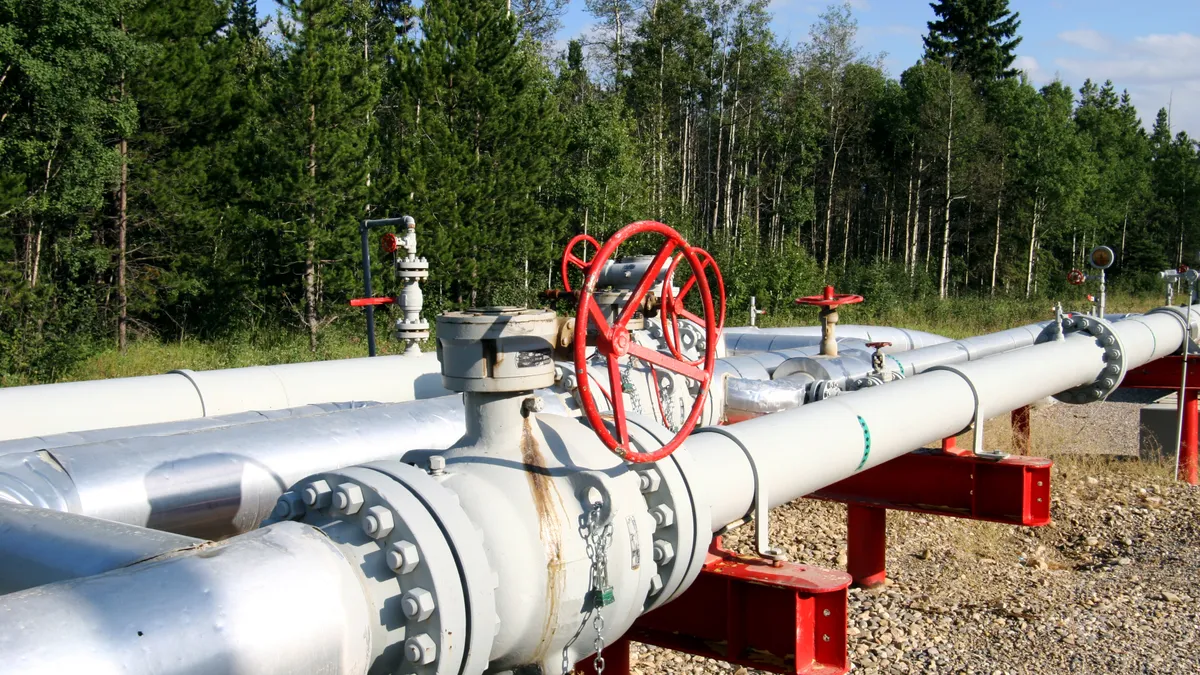Dive Brief:
-
The Federal Energy Regulatory Commission approved on Wednesday a Williams Co. subsidiary’s plan to expand a pipeline despite a report from the New Jersey Board of Public Utilities saying the project isn’t needed.
-
In a sign the project is needed, gas utilities have contracted for all the capacity on Transcontinental Gas Pipe Line Co.’s Regional Energy Access expansion project, FERC said. The project will provide more reliable service on peak winter days and increase supply diversity in the Northeast, according to the decision.
-
A coalition of environmental groups plans to appeal the decision and is urging New Jersey Gov. Phil Murphy, D, to block the pipeline expansion. “[The project] will undermine New Jersey’s goal of reducing greenhouse gasses 50% by 2030 and would actually lead to a 16% increase in our total greenhouse gas output annually,” Ed Potosnak, New Jersey League of Conservation Voters executive director, said in a statement Thursday.
Dive Insight:
FERC’s decision comes as the future of U.S. natural gas infrastructure is debated and as the impact of climate change grows. The agency is also considering changing how it reviews natural gas projects, including assessing whether they are needed.
The Regional Energy Access project in Pennsylvania, New Jersey and Maryland will expand Transco’s pipeline capacity by 829,000 dekatherms a day.
As part of its review of the project, FERC considered three studies conducted for Transco, the New Jersey Conservation Foundation, the NJBPU and the state’s ratepayer advocate.
The study for the state regulators found that New Jersey has enough pipeline capacity to meet its future needs if efficiency and non-pipeline alternatives are available.
In its decision, FERC said it recognized New Jersey has emissions reduction goals, but there is no state requirement that gas utilities adopt non-pipeline alternatives and it isn’t clear alternatives such as renewable natural gas and green hydrogen will be available.
FERC estimated that operating the expanded pipeline could increase New Jersey’s greenhouse gas emissions by 11.8% over 2019 levels. The agency estimated that Delaware’s carbon emissions could increase 4%, Maryland’s, by 1.8%, New York’s by 0.3% and Pennsylvania’s by 1.2%. All the affected states have GHG reduction goals.
Transco has been pressing FERC to make a decision on its proposal. In an early November letter to the agency, the company asked for a decision by the end of that month, saying a delay could lead to missed construction deadlines and make it impossible to bring the project online by the 2023-2024 winter heating season.
In a move that could delay Transco’s plans, FERC stayed its decision to give landowners time to appeal. The stay will be lifted if landowners don’t seek a rehearing within 30 days.
FERC Commissioner James Danly objected to the stay because it imperiled Transco’s ability to meet its construction schedule.
“This project will provide more reliable service to the local distribution companies, which deliver a critical commodity that is needed for home heating and for electric generation throughout the region,” he said, noting Transco can ask FERC to lift the stay.
The decision is in line with FERC’s policy statement for reviewing gas infrastructure set in 1999, FERC Commissioner Allison Clements said in explaining why she voted to approve the project. However, that policy statement is flawed, especially as “market forces and federal, state and local climate protection policies may lead to flat or declining demand for natural gas,” she said.
In its analysis of whether the project is needed, FERC failed to consider how much weight it should give to the study brought by the NJBPU, according to Clements.
“As more states adopt laws and policies like New Jersey’s, we should expect more frequent and active participation by states and their utility regulators in our certificate proceedings,” she said.
FERC should adopt a policy on how to consider and weigh state laws, programs and administrative determinations in future certificate proceedings, she said.
Although the NJBPU submitted a study on the state’s gas pipeline needs, the agency never said whether it supported or opposed the Transco project, FERC Commissioner Mark Christie said. He pointed to agreements from utilities to buy capacity on the pipeline expansion as key evidence it is needed.
“Weighed against the evidence from third-party studies in this proceeding is uncontested evidence that several shippers – unaffiliated with the pipeline developer – freely executed agreements to take service on the facility,” Christie said.















